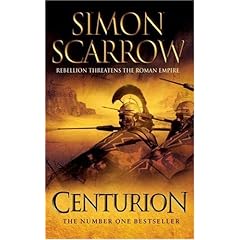 by Mary Harrsch
by Mary HarrschI just finished listening to Caroline Lawrence's novel for young adults (grades 5-8) "The Gladiators from Capua" and found it both exciting and illustrative of both the Roman cultural attitudes towards bloodsport and the daily life of those involved in the production of Roman games and entertainments. The story's young heroes and heroines, each an interesting individual, acted maturely and, despite my own age, I felt like I was a companion to them as they searched the dank recesses of the Flavian amphitheater searching for a friend hiding among the ranks of the gladiators to escape execution as an arsonist. I found their youthful enthusiasm refreshing compared to the often bellicose and cyncial Marcus Didius Falco featured in adult mysteries by Lindsey Davis.
Inspired by Martial's accounts of Roman spectacles, Lawrence pulled no punches in depicting the brutality of theatrically presented executions and the bleak life of those condemned to serve as slaves in the squalor of the hypogeum. But she also revealed the glamorous life of successful gladiators so the readers could understand why men would choose to become professional fighters and members of a gladiatorial familia.
Lawrence presented the lives of the privileged sharply contrasted with the lives of the lowest classes in Roman society and even mixed in a touch of political intrigue and the social machinations that concerned the emperor Titus as he tries to govern the sometimes fickle Roman mob and thwart the power plays of his brother Domitian. The resulting story kept me as enthralled as many adult novels and provided an insightful slice of Roman life in the Flavian period that I think would encourage any child (or adult) to want to learn more about the classical world.
Seattle educator B. Goh observes, "The protagonists--all children--adroitly negotiate a morally difficult world where men, womnen and even children are victims of spectacular (and bloodthirsty) games in the Flavian amphitheater. However, the narration is also quite sensitive to the young reader's possible reactions, and sympathetic views are always heard from at least one character. The subject of personal loss and family tragedy is well explored here. I'm not a a mental health professional, but this books feels like the type that might help a child who has had to cope with the loss of a loved one. I've read every book in the series and as an educator in literature, I highly recommend it, and also the other books in the series."
Although this was my first exposure to Lawrence's work, the novel is actually the sixth in her Roman mysteries series. I definitely look forward to reading more adventures of these intrepid young sleuths.





